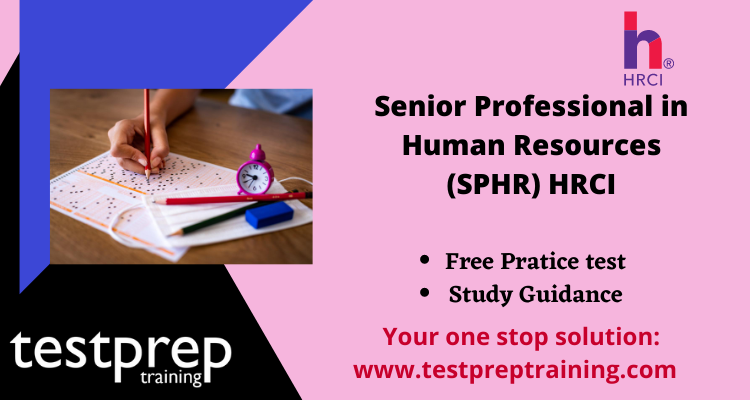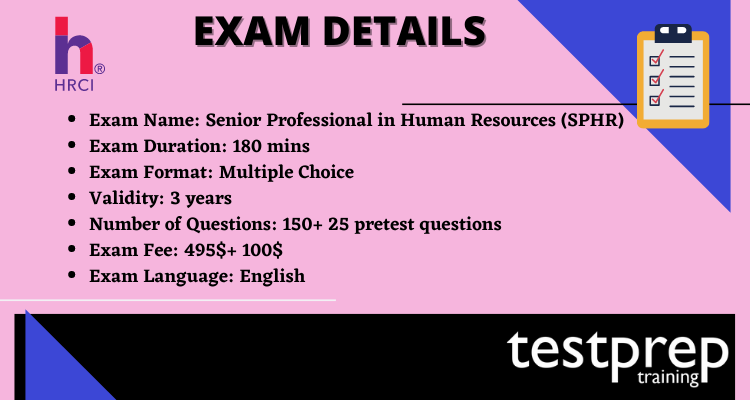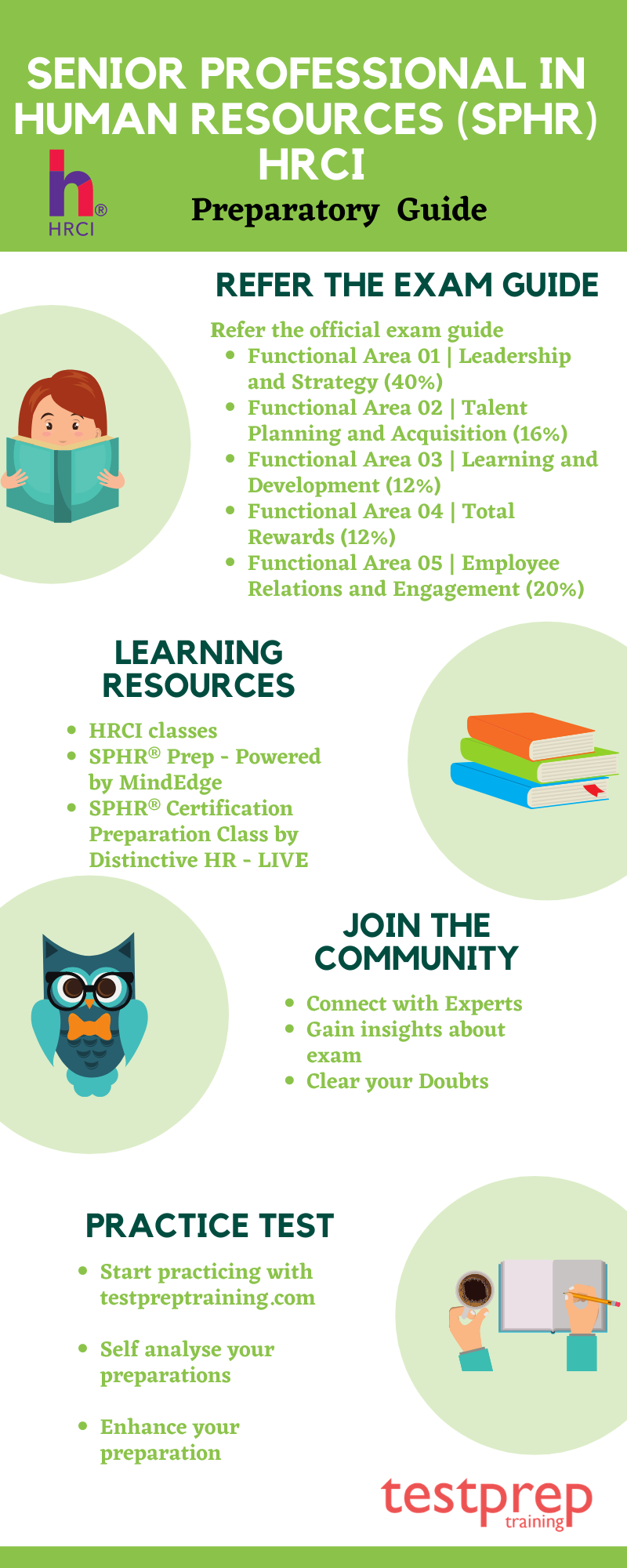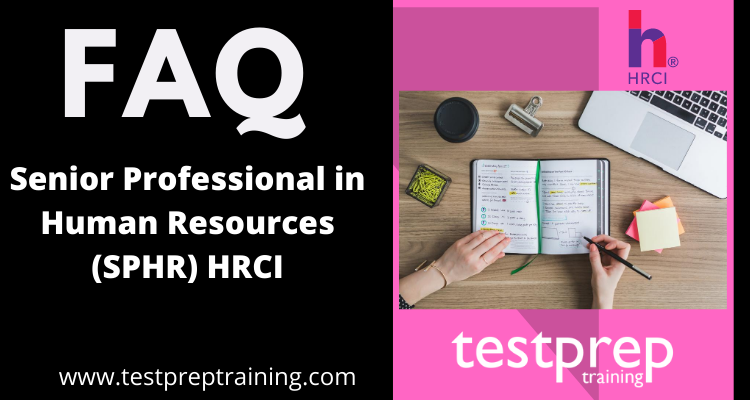Senior Professional in Human Resources (SPHR) HRCI

Senior Professional in Human Resources (SPHR) HRCI examination illustrate your mastery of the strategic and policy-making aspects of HR management as practised in the U.S. The credential is designed for big-picture thinkers responsible for planning rather than implementing HR policy. SPHR professionals are highly in demand for their proven accountability for HR department goals, breadth and depth of knowledge in all HR disciplines, and for understanding business issues beyond the HR function.
Exam Prerequisites
This examination will definitely help get a hike in your current salary or a promotion in your department. However, you just to fulfill the below-mentioned criteria to give the SPHR examination:
- Should have at least four years of experience in a professional-level HR position + a Master’s degree or higher,
- Have at least five years of experience in a professional-level HR position + a Bachelor’s degree, OR
- Have at least seven years of experience in a professional-level HR position + a high school diploma.
Exam Details
The Senior Professional in Human Resources (SPHR) consists of 150 scored questions (mostly multiple-choice) + 25 pretest questions and the total time given is 3 hours. However, it is a Computer-based exam at a Pearson VUE testing center or at your home or office using OnVUE. Also, the cost of the examination is $ 495 plus application fee of $100.

SPHR Exam Registration
The candidate should follow these step for registering themselves for the SPHR examination:
- Click on apply now, on the official SPHR website.
- A login page will appear if you already have an account, kindly login to it. Also, if you don’t have an account you can sign up as well.
- Follow the prompt and then, complete your registration accordingly.
For more information, visit Senior Professional in Human Resources FAQ
SPHR Course Outline
Functional Area 01 | Leadership and Strategy (40%)
Leading the HR function by developing HR strategy, contributing to organizational strategy, influencing people management practices, and monitoring risk.
Functional Area 01 – Responsibilities
- Develop and execute HR plans that are aligned to the organization’s strategic plan (for example HR strategic plans, budgets, business plans, service delivery plans, HRIS, technology)
- Evaluate the applicability of federal laws and regulations to organizational strategy(for example policies, programs, practices, business expansion/reduction)
- Analyze and assess organizational practices that impact operations and people management to decide on the best available risk management strategy (for example avoidance, mitigation, acceptance)
- Interpret and use business metrics to assess and drive the achievement of strategic goals and objectives (for example key performance indicators, financial statements, budgets)
- Design and evaluate HR data indicators to inform strategic actions within the organization (for example turnover rates, cost per hire, retention rates)
- Evaluate credibility and relevance of external information to make decisions and recommendations (for example salary data, management trends, published surveys and studies, legal/regulatory analysis)
- Contribute to the development of the organizational strategy and planning (for example vision, mission, values, ethical conduct)
- Develop and manage workplace practices that are dispose with the organization’s statements of vision, values, and ethics to shape and reinforce organizational culture
- Design and manage effective change strategies to align organizational performance with the organization’s strategic goals
- Establish and manage effective relationships with key stakeholders to influence organizational behavior and outcomes.
Functional Area 01 – Knowledge Gained
- Vision, mission, and values of an organization and applicable legal and regulatory requirements
- Strategic planning process
- Management functions, including planning, organizing, directing, and controlling
- Corporate governance procedures and compliance
- Business elements of an organization (for example products, competition, customers,
- technology, demographics, culture, processes, safety, and security)
- Third-party or vendor selection, contract negotiation, and management, including
- development of requests for proposals (RFPs)
- Project management (for example goals, timetables, deliverables, and procedures)
- Technology to support HR activities
- Budgeting, accounting, and financial concepts (for example: evaluating financial statements,
- budgets, accounting terms, and cost management)
- Techniques and methods for organizational design (for example outsourcing, shared services,
- organizational structures)
- Methods of gathering data for strategic planning purposes (for example Strengths, Weaknesses,
- Opportunities, and Threats [SWOT], and Political, Economic, Social, and Technological [PEST])
- Qualitative and quantitative methods and tools used for analysis, interpretation,
- and decision-making purposes
- Change management processes and techniques
- Techniques for forecasting, planning, and predicting the impact of HR activities and programs
- across functional areas
- Risk management
- How to deal with situations that are uncertain, unclear, or chaotic
Functional Area 02 | Talent Planning and Acquisition (16%)
Forecast organizational talent needs and develops strategies to attract and engage new talent.
Functional Area 02 – Responsibilities
- Evaluate and forecast organizational needs throughout the business cycle to create or develop workforce plans (for example corporate restructuring, workforce expansion, or reduction)
- Develop, monitor, and assess recruitment strategies to attract desired talent(for example labor market analysis, compensation strategies, selection process, onboarding, sourcing and branding strategy)
- Develop and evaluate strategies for engaging new employees and managing cultural integrations(for example new employee acculturation, downsizing, restructuring, mergers and acquisitions, divestitures, global expansion)
Functional Area 02 – Knowledge Gained
- Planning techniques (for example succession planning, forecasting)
- Talent management practices and techniques (for example: selecting and assessing employees)
- Recruitment sources and strategies
- Staffing alternatives (for example outsourcing, temporary employment)
- Interviewing and selection techniques and strategies
- Impact of total rewards on recruitment and retention
- Termination approaches and strategies
- Employee engagement strategies
- Employer marketing and branding techniques
- Negotiation skills and techniques
- Due diligence processes (for example mergers and acquisitions, divestitures)
- Transition techniques for corporate restructuring, mergers, and acquisitions, offshoring, and divestitures
- Methods to assess past and future staffing effectiveness (for example cost per hire, selection ratios, adverse impact)
Functional Area 03 | Learning and Development (12%)
Develop training, development, and employee retention strategies.
Functional Area 03 – Responsibilities
- Develop and evaluate training strategies (for example modes of delivery, timing, content) to increase individual and organizational effectiveness
- Analyze business needs to develop a succession plan for key roles (for example: identify talent, outline career progression, coaching, and development) to promote business continuity
- Develop and evaluate employee retention strategies and practices (for example: assessing talent, developing career paths, managing job movement within the organization)
Functional Area 03 – Knowledge Gained
- Training program design and development
- Adult learning processes
- Training and facilitation techniques
- Instructional design principles and processes (for example needs analysis, content chunking, process flow mapping)
- Techniques to assess training program effectiveness, including the use of applicable metrics
- Career and leadership development theories and applications
- Organizational development (OD) methods, motivation methods, and problem-solving techniques
- Coaching and mentoring techniques
- Effective communication skills and strategies (for example presentation, collaboration, sensitivity)
- Employee retention strategies
- Techniques to encourage creativity and innovation
Functional Area 04 | Total Rewards (12%)
Monitor the effectiveness of compensation and benefits strategies for attracting, rewarding, and retaining talent.
Functional Area 04 – Responsibilities
- Analyze and evaluate compensation strategies (for example philosophy, classification, direct, indirect, incentives, bonuses, equity, executive compensation) that attract, reward, and retain talent.
- Analyze and evaluate benefit strategies (for example health, welfare, retirement, recognition programs, work-life balance, wellness) that attract, reward, and retain talent.
Functional Area 04 – Knowledge Gained
- Compensation strategies and philosophy
- Job analysis and evaluation methods
- Job pricing and pay structures
- External labor markets and economic factors
- Executive compensation methods
- Non-cash compensation methods
- Benefits program strategies
- Fiduciary responsibilities
- Motivation concepts and applications
- Benchmarking techniques
Functional Area 05 | Employee Relations and Engagement (20%)
Develop and/or monitor strategies impacting employee satisfaction and performance including diversity
and inclusion, safety, security, and labor strategies.
Functional Area 05 – Responsibilities
- Design and evaluate strategies for employee satisfaction (for example recognition, career path) and performance management (for example performance evaluation, corrective action, coaching)
- Analyze and evaluate strategies to promote diversity and inclusion
- Evaluate employee safety and security strategies (for example OSHA, HIPAA, emergency response plan, building access, data security/privacy)
- Develop and evaluate labor strategies (for example collective bargaining, grievance program, concerted activity, staying union-free, strategically aligning with labor)
Functional Area 05 – Knowledge Gained
- Strategies to facilitate positive employee relations
- Methods for assessing employee attitudes, opinions, and satisfaction
- Performance management strategies
- Human relations concepts and applications
- Ethical and professional standards
- Diversity and inclusion concepts and applications
- Occupational injury and illness prevention techniques
- Workplace safety and security risks, and strategies
- Emergency response, business continuity and disaster recovery strategies
- An internal investigation, monitoring, and surveillance techniques
- Data security and privacy
- The collective bargaining process, strategies, and concepts (for example contract negotiation, costing, administration)
Preparatory Guide for Senior Professional in Human Resources (SPHR) Exam
Preparing with the right resources is the key to clear any exam. Moreover, you need consistency and determination throughout your journey towards the exam. Also, you must follow a study pattern while learning from authentic and genuine resources. We present a Preparatory Guide that will act as a bridge for your preparation to get a step closer to qualifying SPHR Exam. Success can be achieved only with the right methodology and determination. Let’s discuss step by step guide to prepare better –

Refer the Exam Guide
The course domains and modules act as a blueprint for the exam. HRCI also provides the complete course guide on its official website. However, it is the most authentic site to provide any information regarding the Senior Professional in Human Resources (SPHR) exam. After you’ve gone through the basic exam details. It’s time to start your preparation and practice. And hence, enabling you to gain the required command to earn your desired certification.
Learning Resources
HRCI provides you various material and resources for preparing. They have various kind of online classes and training. Each class has different time duration and charges but don’t worry we have provided you details related to every class:
SPHR Prep – Powered by MindEdge: The cost of this class is $399. It is an online class that can be on a mobile phone and as well as on the desktop. Key features for this course include exam-taking tips, a detailed diagnostic test, practice questions at the end of each module, and a full-length, 175-question practice exam. Over 350 practice questions address the five knowledge areas covered in the SPHR exam.
SPHR Certification Preparation Class by Distinctive HR – LIVE: It is an instructor-led course.DHR’s program is an online classroom setting with the option to ask questions in real-time of the instructor and certified staff, as well as weekly online office hours with the instructor outside of class time. Each SPHR prep class has 12 weekly lecture sessions of 3 hours.
Materials include a study guide, a set of downloadable audio files (not an audio book), an updated booklet on the seven essential principles of HRM necessary to pass the exam (The Seven Princes), a set of flashcards, a slide booklet to follow along in class, and access to DHR’s Learning Management System (LMS) for 1 year from the date your class begins. The LMS provides access to sample tests (1800+ questions), training games, and online training videos that are aligned with the HRCI body of knowledge. International candidates will receive the digital SPHR Course version which provides access to the same LMS, as well as the downloadable audio files, digital flashcards on the LMS, and PDF versions of both books.
There are more courses and classes on the this page, which can help you prepare according to your own zone.
Join a Community
Engaging oneself in a study group will encourage and help the candidate to learn more. The discussions in the group will help them to develop the necessary knowledge required to clear the examination. Interacting with the people who have the same career path will be an added advantage. These discussions make the studies more comprehensive. Also, introverts get a chance to express themselves, who might otherwise prefer staying out of discussions. Also, forums work really well to build a community that is essential for understanding others. Therefore, practice, discuss and study to become a successful Senior Professional in Human Resources (SPHR).
Practice Test
To ace anything you need to practice it and for the practice, you need sample papers and test series which will give you the experience of the real-time examination. Therefore, we at Testpreptarining provide you with the test series, specially designed for the Senior Professional in Human Resources (SPHR) exam, After all, practice makes a man perfect. However, analyzing your answers will help you identify the areas where you need to give special attention to, and will also let you know your alignment with the exam objectives. Start Practicing Now!


